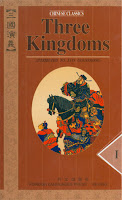 The third
example I would like to share with you is the historical novel Three Kingdoms, written in the tradition
of the Spring and Autumn Annals which are attributed to Confucius. The
historical novel of the Three Kingdoms is so important because it describes
The third
example I would like to share with you is the historical novel Three Kingdoms, written in the tradition
of the Spring and Autumn Annals which are attributed to Confucius. The
historical novel of the Three Kingdoms is so important because it describes
While
‘preserving moral judgment’ in every turn of phrase the novel marks the ‘rise
and fall of kingdoms’ in a grand sweep of time. The novel has added to this
tradition by reaching the broadest possible public with its message. This
challenges a reader to reflect on how his own conduct measures up to the
standards of loyalty and filial piety as they are fulfilled or betrayed in the
novel. As Jiang Daqi said in the preface to the novel ‘merely to read it but
not apply [its lessons] vigorously in one’s own life, is inferior to [real]
study.’
 Three
Kingdoms is placed in a time of dynamic transition. ‘Virtue’ (Dé), comes to
force in the novel as the main qualification of a new ruler. Virtue, “a sine
qua none” of rule, is ascribed to every emperor. But the word describes his
character rather than the manner of his accession. If he comes to power by
filial right or by election within the royal family, he will claim that his
predecessors’ virtue flows in him. If he comes to power by abdication,
usurpation or conquest, his spokesmen will contend that he possesses his own
virtue and is thereby entitled to found a new dynasty because the sovereign he
supplants has lost his virtue.
Three
Kingdoms is placed in a time of dynamic transition. ‘Virtue’ (Dé), comes to
force in the novel as the main qualification of a new ruler. Virtue, “a sine
qua none” of rule, is ascribed to every emperor. But the word describes his
character rather than the manner of his accession. If he comes to power by
filial right or by election within the royal family, he will claim that his
predecessors’ virtue flows in him. If he comes to power by abdication,
usurpation or conquest, his spokesmen will contend that he possesses his own
virtue and is thereby entitled to found a new dynasty because the sovereign he
supplants has lost his virtue. In the
novel the main character Liu Xuande has been developed through his claim to
succeed Emperor Xian. This claim originates from his lineage and his virtue.
Liu Xuande bears the imperial surname, but he is not the only leader with the
same name. To reinforce his claim to legitimacy, Xuande traces his ancestry
back to Emperor Jing and his successor Liu Xiu. Liu Xuande’s link to the royal
house opens the way to his advancement, especially after Emperor Xian
acknowledges Xuande as his uncle. Additionally, Xuande has appropriate
leadership qualities: a natural charisma, magnetism, called Dé. The force of
his persona attracts and holds the allegiance of his associates, his armies,
and the population he governs. He simply wins men’s hearts. And Xuande’s virtue
is the higher reason why he deserves to rule, a reason transcending lineage or
possession of territory.
In the
novel the main character Liu Xuande has been developed through his claim to
succeed Emperor Xian. This claim originates from his lineage and his virtue.
Liu Xuande bears the imperial surname, but he is not the only leader with the
same name. To reinforce his claim to legitimacy, Xuande traces his ancestry
back to Emperor Jing and his successor Liu Xiu. Liu Xuande’s link to the royal
house opens the way to his advancement, especially after Emperor Xian
acknowledges Xuande as his uncle. Additionally, Xuande has appropriate
leadership qualities: a natural charisma, magnetism, called Dé. The force of
his persona attracts and holds the allegiance of his associates, his armies,
and the population he governs. He simply wins men’s hearts. And Xuande’s virtue
is the higher reason why he deserves to rule, a reason transcending lineage or
possession of territory.
The
entire novel is a study of what kind of leadership is necessary to lead people
through the times of trouble on a way to reform court and reunify empire. The
moral of the novel explains that a superior leader is like water: it is not
destructive, but slowly and gradually employs one’s energy to mold and steer
people he or she leads.

No comments:
Post a Comment
Note: Only a member of this blog may post a comment.